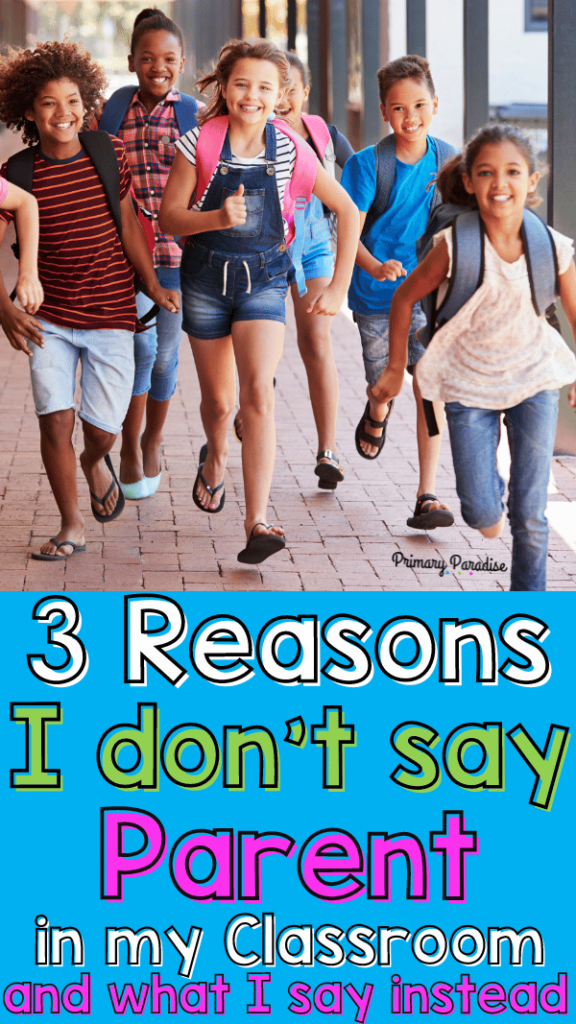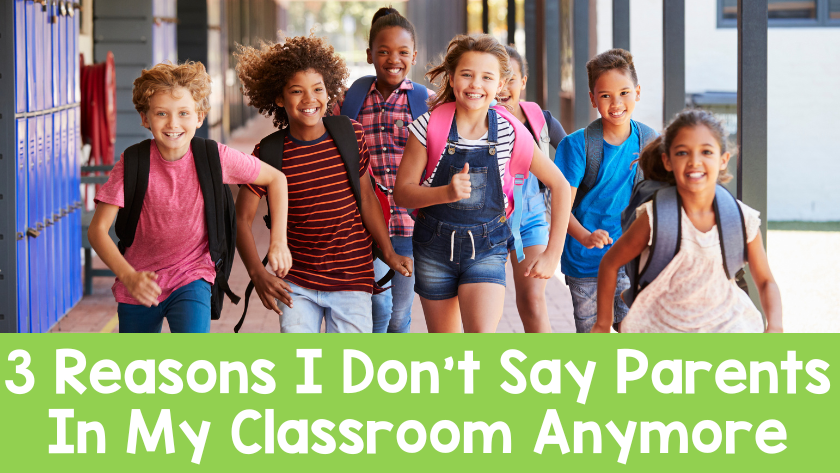How do we talk about the people who take care of our students in an inclusive way? The default mode for most teachers to is refer to the adults who take care of students as parents. However, not every child lives with our is taken care of by a mom or a dad. So, a few years ago I made the switch to not using the term parents. I have never looked back. Here’s 3 reasons I don’t say “parents” anymore and some alternative terms for parents to use in your classroom.
Not Saying Parents Acknowledges Diverse Family Structures
Families are super diverse and come in all shapes and sizes. Not every student in your class comes from the same home situation or background, and it’s important to acknowledge that. Some students come from single-parent households, same-sex house holds, grandparents, aunts or uncles, or other family members as primary caregivers, adoptive parents, or guardians. When teachers use the term parent, it can often erase and invalidate the experience of many of our students. Using more inclusive language is a simple way to acknowledge and respect all kinds of families.
Not Saying Parents Helps to Avoid Stereotypes
Using inclusive language when referring to families is helpful to the students in diverse situations. It is also beneficial for the students who are in a more “traditional” family set up. It helps them to grow and expand their ideas and views of what makes up a family. Using the term “parents” can perpetuate assumptions and stereotypes about traditional family roles. This can potentially reinforcing gender norms and outdated societal expectations. In contrast, employing inclusive language recognizes that the role of caregiver is not necessarily tied to gender or a specific familial relationship. By embracing more neutral language, teachers can foster a supportive and inclusive learning environment where students feel comfortable expressing themselves without fear of judgment or prejudice. It helps children who come from more traditional backgrounds to understand all different family set ups as well.
Not Saying Parents Helps Students from Diverse Backgrounds Feel Seen
Inclusive language empowers students from diverse backgrounds and helps build a sense of belonging within the school community. When teachers recognize and use language that reflects the richness of students’ experiences, they send a powerful message of acceptance and understanding. This, in turn, can positively impact a child’s self-esteem, academic performance, and overall emotional well-being. Creating an inclusive classroom environment promotes a greater sense of unity among students. It encourages them to celebrate their differences and learn from one another. Instead of a child who is being raised by an aunt or uncle feeling left out, they can feel included and welcomed and understood.
So What Can Teachers Say Instead of Parents?
So, what are some words we, as teachers, can use to replace parents? Here are some options. There’s no one right word, so feel free to try different options out and see what feels most comfortable for you.
Alternatives to Parents for Teachers
Grown Ups– I am going to start with my personal favorite which is grown-ups. Since I teach primary grades, I like to keep things simple. Grown Ups is my go to because it encompasses every possibility of a legal guardian. I typically refer to “your grown ups”.
Adults– You can also use adults in the same way. As in “make sure to show your art project to your adults when you get home today!”
Caregivers– This can be a really great option as well. It might take some explaining to students, but it can be as simple as saying “a caregiver is the person who takes care of you”.
Guardians- I don’t use this one with students, but when I write emails, guardians is my go to word as in “Dear Guardians, Tomorrow is a half day.”
Families- Although family or families could work, I don’t typically use this option because sometimes children won’t be taken care of by people they consider family. For example as if they’re in the foster care system or do not have a stable, consistent guardian. However, if you know the make up of your students home lives well enough to know they would consider their grown ups “family”, it can be a good option.
What If All of My Students have “Parents” At Home in a “Traditional” Family Set Up
I can understand how it might seem like this is unnecessary if every child in your class has a “traditional” family set up. However, there’s a few things to keep in mind. First, you may not actually know the make up or background of every family. Things aren’t always what they appear. Secondly, just as books can be windows and mirrors, the language we use can be a window or a mirror. Using inclusive language to refer to caregivers can help students who come from a more traditional background recognize and understand different family backgrounds.
Keep Reading and Learning:
- Reading Support Guide for At Home
- Top 4 Ways to Send a Weekly Newsletter
- 7 Picture Books for Kids With Angry Feelings
- Basic Sentence Writing Made Easy




